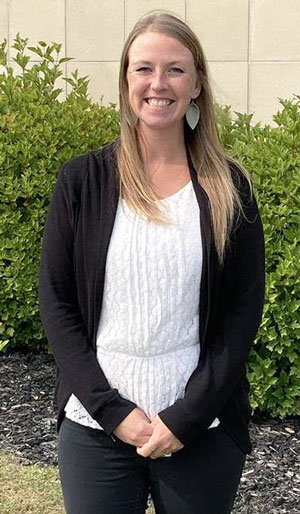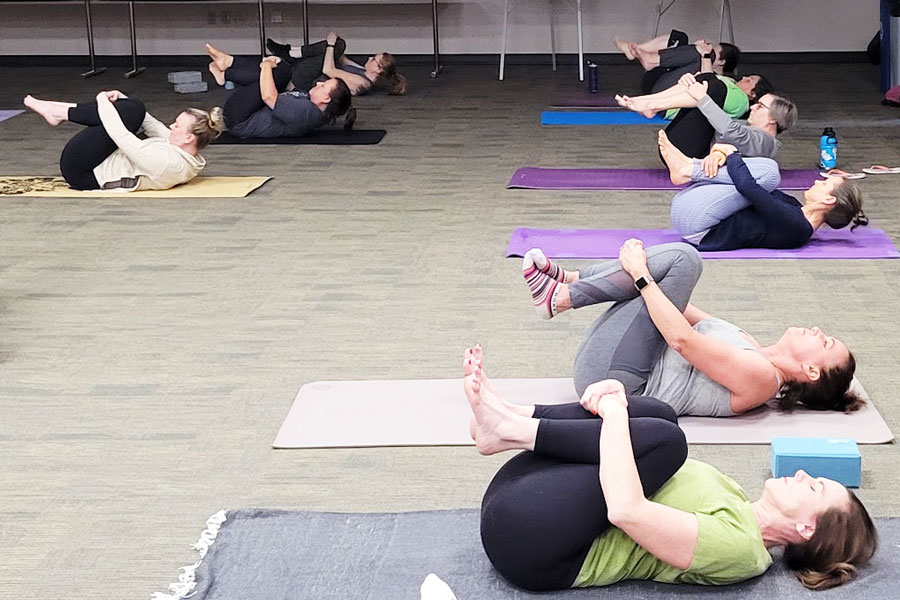Multiple districts – In Gary Moline’s 39 years in public education, he hasn’t seen anything like it.
Students struggling with anxiety, depression, thoughts of suicide and self-harm, teachers referring distressed students to counselors: “All of that has been magnified like I’ve never seen before in the years I’ve been in this business,” said Moline, a counselor at Kent Career Tech Center and with Student Support Services of Kent ISD.
Moline knows this to be true for schools throughout Kent County, not just the students he works with at the Tech Center. He works with about 140 counselors countywide, in public, private and home schools.
“It’s students just showing up at our doorstep saying ‘I have such anxiety today that I can’t function.’ That’s every day,” Moline said recently at the campus of Kent ISD. In fact, that same morning he had counseled a student experiencing high anxiety intensified by a social media post about him.
‘Everybody feels lost and confused and overwhelmed. Even though it’s supposed to feel normal, it doesn’t feel normal at all.’
– Kasey Hagler, president-elect, West Michigan Counseling Association
The emotional problems students have experienced during the pandemic are overloading the capacity of schools to assist them, Moline and others say. There are not enough counselors, social workers or other staff to accommodate the need. But classroom teachers increasingly have had to call on counselors when facing difficult student behavior.
“Everybody’s at their wits’ end: ‘I don’t know what to do with this (student), so please come handle him or her,’” said Rukshana Ilahi, a Kent ISD mental wellness consultant who works to support educator mental health and counseling strategies.
Yet despite increased state funding for mental health last year and $361 million proposed by Gov. Gretchen Whitmer for 2022-23, schools can’t find enough applicants to fill the need, she said: “We have the money but we don’t have the people.”
Related story: Staff shortages, increased school funding create conundrum

Job Openings but No Takers
In 2020-21, Michigan’s statewide student-to-counselor ratio was 638 to 1, third-lowest in the nation and far from the 250-to-1 ratio recommended by the American School Counseling Association. More than one-third of districts reported not having a counselor.
Kasey Hagler, a counselor at Northview High School, points to these figures to illustrate the crying need for mental-health workers in schools. She is president-elect of the West Michigan Counseling Association, which counts 130-plus member counselors from Kent, Ottawa and Allegan counties. The problem is not only finding new counselors but keeping existing ones, she says.
“I don’t think there’s a week that goes by that I don’t get a job notification for a school counselor,” said Hagler, one of four counselors at Northview for 1,040 students, giving them a 260-to-1 ratio. As of May 24, seven job openings were posted for social workers and one for a guidance counselor in Kent ISD.
‘We are firefighters all day long. Every day it’s intense. You’ve got to be able to compartmentalize that at the end of the day, and go home.’
– Gary Moline, counselor with Student Support Services, Kent ISD
The shortage is such that private agencies are helping some public schools. Northview utilizes the services of a community social worker with Arbor Circle. Wedgwood Christian Services provides staff to half a dozen Kent ISD schools, working alongside school counselors to help individual students and educate small groups about substance abuse.
This is Still Not Normal
As a 10-year school counseling veteran, Hagler has seen the toll two years of pandemic learning has taken on students and their families. The chronic uncertainty has exacerbated the anxiety and depression that have long been concerns for teen mental health, Hagler said. Coming back to in-person classrooms after long spells of virtual or hybrid learning has been disorienting for many, including teachers.
“Everybody feels lost and confused and overwhelmed,” Hagler said. “Even though it’s supposed to feel normal, it doesn’t feel normal at all.”
‘We have the money but we don’t have the people.’
– Rukshana Ilahi, Kent ISD mental wellness consultant
Sitting in a class with 30 other high school students used to feel normal, but for many it doesn’t now. Today’s sophomores didn’t get to experience that as freshmen.
“We have a high number of students anxious about just walking into our building, because they’ve been out of it for a period of time,” she said. “Students are just uncomfortable with one thing or another. They’re just off kilter.”

Staff Struggles with Burnout
Educators are also struggling to re-engage with what’s supposed to feel normal. A sense of collegiality was lost during the isolation of the pandemic, says Kent ISD’s Moline. Returning to in-person learning, staff have found many students have lost ground socially as well as academically and are acting out more.
That’s all contributing to people leaving the profession and discouraging others from entering it, said Ilahi, the Kent ISD wellness consultant. “Burnout is a huge contributor for teachers and school staff,” Ilahi said.
Newly hired to Kent ISD this school year, Ilahi has created a wellness program to support the mental health of counselors, teachers and other staff (see related story). She’s also implemented a program developed by the University of Michigan to help teach students skills for coping with anxiety and depression.
However, the daunting demands of schools these days, modest pay and stresses of the work are keeping many potential counselors and social workers from entering the workforce. Hagler, an adjunct instructor at Grand Valley State University, said in 2021 only one-third of Michigan residents qualified as school counselors were doing that job.
Further, community counselors are also overloaded, meaning parents seeking more intensive counseling for their children may have to wait for months for an appointment, Hagler said.
A Difficult but Gratifying Field
Some newly hired mental-health workers find they weren’t prepared for the demands of the work, said Moline, a school counselor for 30 years.
“We are firefighters all day long,” Moline said. “Every day it’s intense. You’ve got to be able to compartmentalize that at the end of the day, and go home.”
He had fought one fire that day with the student suffering from anxiety. Along with another counselor he led the student through breathing exercises and problem-solving strategies. The student later was referred for more intensive mental-health assistance.
Despite its stresses, Moline says he loves helping such students, “the tough ones.” As he prepares to retire, he says more people need to see the worth of working with students despite the many challenges involved. If they did, there wouldn’t be as much of a problem finding enough people to adequately staff the schools, he says.
“There’s a value shortage. We need to change that.”
Yoga, mindfulness, problem-solving: educators need help, too
As she prepared to lay down her yoga mat, Godfrey-Lee Middle School English teacher Alissa Huggins reflected on the anxieties her seventh-graders have lived through this school year – and on her own stress in working with them.
“It’s been awful,” Huggins said of the uptick in behavior problems her students have experienced as they’ve struggled to readjust to in-person learning in year two of the pandemic.
Fortunately, when a student is acting out or shuts down in class, she can call on Matt Wright, a social worker hired this year with an influx of equalized state funding. Often he’ll pull a student out of class and talk to them “one-on-one in a way that I just can’t always get through to them,” she said, returning them to class more ready to learn.
This yoga session in a Kent ISD conference room will help her return to class more ready to teach, Huggins added: “I used to do yoga regularly before COVID, and I miss it for my mental health. It’s just so good.”
The session was part of a series of wellness activities offered this month to Kent County teachers, counselors and other educators, culminating in a 5K run/walk on Memorial Day. The yoga, mindfulness practices and professional development trainings were part of a new Kent ISD initiative to support the mental health of educators as they in turn deal with a pandemic-fueled mental-health crisis among their students.
“I always start with, ‘You have to address you first, and we have to think about systems, and we have to think about how do we then turn around and help kids,’” said Rukshana Ilahi, hired last fall as a Kent ISD mental wellness consultant. “There has to be a culture that supports them first in order to support students and families.”










